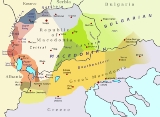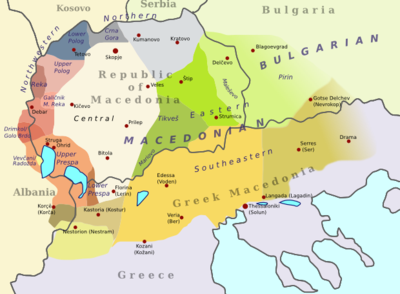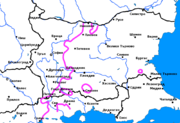
Solun-Voden dialect
Encyclopedia


South Slavic languages
The South Slavic languages comprise one of three branches of the Slavic languages. There are approximately 30 million speakers, mainly in the Balkans. These are separated geographically from speakers of the other two Slavic branches by a belt of German, Hungarian and Romanian speakers...
dialect spoken in parts of the Greek periphery of Central Macedonia
Central Macedonia
Central Macedonia is one of the thirteen regions of Greece, consisting of the central part of the region of Macedonia. With a population of over 1.8 million, it is the second most populous in Greece after Attica.- Administration :...
, and the vicinity of Gevgelija
Gevgelija
Gevgelija is a town with a population of 15,685 located in the very southeast of the Republic of Macedonia along the banks of the Vardar River, situated at the country's main border with Greece , the point which links the motorway from Skopje and three other former Yugoslav capitals with...
and Dojran
Dojran
Dojran was a city located on the western shore of Dojran Lake in the south-eastern part of the Republic of Macedonia. Today, it is collective name for two villages that exist on the territory of the ruined city: Nov Dojran and Star Dojran, which contains both old ruins and recent construction,...
in the Republic of Macedonia
Republic of Macedonia
Macedonia , officially the Republic of Macedonia , is a country located in the central Balkan peninsula in Southeast Europe. It is one of the successor states of the former Yugoslavia, from which it declared independence in 1991...
. It has been treated as part of both Macedonian
Macedonian language
Macedonian is a South Slavic language spoken as a first language by approximately 2–3 million people principally in the region of Macedonia but also in the Macedonian diaspora...
and Bulgarian
Bulgarian dialects
Bulgarian dialects are the regional spoken varieties of the Bulgarian language, a South Slavic language. Bulgarian dialectology dates to the 1830s and the pioneering work of Neofit Rilski, Bolgarska gramatika...
dialectology.
Dialect area
The dialect is named after Slavic toponyms for the cities of ThessalonikiThessaloniki
Thessaloniki , historically also known as Thessalonica, Salonika or Salonica, is the second-largest city in Greece and the capital of the region of Central Macedonia as well as the capital of the Decentralized Administration of Macedonia and Thrace...
(Solun), Edessa
Edessa, Greece
Edessa , is a city in northern Greece and the capital of the Pella regional unit, in the Central Macedonia region of Greece. It was also the capital of the defunct province of the same name.-Name:...
(Voden) and Kilkis
Kilkis
Kilkis is an industrial city in Central Macedonia, Greece. As of 2001 there were 17,430 people living in the city proper, 24,812 people living in the municipal unit, and 56,336 in the municipality of Kilkis. It is also the capital city of the regional unit of Kilkis.-Name:Kilkis is located in a...
(Kukush), or after the river Vardar
Vardar
The Vardar or Axios is the longest and major river in the Republic of Macedonia and also a major river of Greece. It is long, and drains an area of around . The maximum depth of river is ....
. In terms of Macedonian dialectology, the dialect is classified as a member of the south-eastern subgroup of the Eastern and Southern group of Macedonian dialects
Dialects of the Macedonian language
The dialects of Macedonian comprise the Slavic dialects spoken in the Republic of Macedonia as well as some varieties spoken in the wider geographic region of Macedonia. They exist as part of the dialect continuum of South Slavic languages that joins the Macedonian language with Bulgarian to the...
, spoken in an area that also covers Veria
Veria
Veria is a city built at the foot of Vermion Mountains in Greece. It is a commercial center of Macedonia, the capital of the prefecture of Imathia, the province of Imathia and the seat of a bishop of the Greek Orthodox Church...
, Giannitsa
Giannitsa
Giannitsa is the largest town and a former municipality in Pella regional unit, Greece. Since the 2011 local government reform it is part of the municipality Pella, of which it is a municipal unit...
, and the towns of Dojran
Dojran
Dojran was a city located on the western shore of Dojran Lake in the south-eastern part of the Republic of Macedonia. Today, it is collective name for two villages that exist on the territory of the ruined city: Nov Dojran and Star Dojran, which contains both old ruins and recent construction,...
and Gevgelija
Gevgelija
Gevgelija is a town with a population of 15,685 located in the very southeast of the Republic of Macedonia along the banks of the Vardar River, situated at the country's main border with Greece , the point which links the motorway from Skopje and three other former Yugoslav capitals with...
in the Republic of Macedonia
Republic of Macedonia
Macedonia , officially the Republic of Macedonia , is a country located in the central Balkan peninsula in Southeast Europe. It is one of the successor states of the former Yugoslavia, from which it declared independence in 1991...
.
In terms of Bulgarian dialectology
Bulgarian dialects
Bulgarian dialects are the regional spoken varieties of the Bulgarian language, a South Slavic language. Bulgarian dialectology dates to the 1830s and the pioneering work of Neofit Rilski, Bolgarska gramatika...
, Solun dialect is a separate Eastern Bulgarian dialect, spoken in the northern part of today's Thessaloniki Prefecture
Thessaloniki Prefecture
Thessaloniki is one of the regional units of Greece. It is part of the Region of Central Macedonia. Its capital is the city of Thessaloniki. It is the second most populous regional unit in Greece, behind Central Athens.-Geography:...
in Greece. Solun and Drama-Ser dialect
Ser-Drama-Lagadin-Nevrokop dialect
The Ser-Drama-Lagadin-Nevrokop dialect is a transitional South Slavic dialect which belongs to both the southeastern group of Bulgarian language, and the southeastern subgroup of dialects of the Macedonian language....
s are grouped as western Rup dialects, part of the large Rup dialect massif of Rhodopes and Thrace which are transitory between the Western and Eastern Bulgarian dialects
Bulgarian dialects
Bulgarian dialects are the regional spoken varieties of the Bulgarian language, a South Slavic language. Bulgarian dialectology dates to the 1830s and the pioneering work of Neofit Rilski, Bolgarska gramatika...
. The dialect spoken around Voden and Kukush, as well as in the region of the Lower Vardar, to the west of Thessaloniki, is characterized as Western Bulgarian Kukush-Voden dialect, which demonstrates some connections with Eastern Bulgarian dialects, like the reduction and absorption of unstressed vowels, and retention of the sound x /x/.
Suho-Visoka sub-dialect
The Suho-Visoka sub-dialect is spoken in the city of Salonika and within the vicinity of the city. The dialect is also found in the town of LagkadasLagkadas
Lagadas ; is a town and a municipality in the northeast part of Thessaloniki regional unit, Greece. Population 16,836 .-Historic Facts:Zübeyde Hanım , Mustafa Kemal Atatürk's mother, was born in Lagadas in 1857.-Municipality:...
. The dialect is best preserved in the villages of Sochos
Sochos
Sochos is a village and a former municipality in the Thessaloniki regional unit, Greece. Since the 2011 local government reform it is part of the municipality Lagkadas, of which it is a municipal unit. Population 5,773 .-Subdivisions:...
(Сухо, Suho), Osa
Osa
Osa may refer to:*Osa peninsula, a peninsula in Costa Rica*Osa, Allahabad, a village in Allahabad, India*Osa, Warmian-Masurian Voivodeship *Osa, Russia, name of several inhabited localities in Russia*Osa class missile boat...
(Висока, Visoka), Nikopoli (Зарово, Zarovo), Xylopoli (Негован, Negovan), Levchohori (Клепе, Klepe), Klisali (Клисали, Klisali) and Assiros
Assiros
Assiros is a village and a former municipality in the Thessaloniki regional unit, Greece. Since the 2011 local government reform it is part of the municipality Lagkadas, of which it is a municipal unit. Population 3,861 ....
(Гвоздово, Gvozdovo). The sub-dialect has been referred to as Bogdanski Govor , in reference to its position on the "Bogdan" mountain.
Phonological characteristics
- Retention of Proto-Slavic nasal vowels (Solun dialect in the region north-east of Solun): rə ̃kа (mk:raka, bg:rəka), skɤ ̃p (mk:skap, bg:skɤp), pɛ ̃tuk (mk:pɛtok, bg:pɛtək), tʃɛ ̃du (bg, mk:tʃɛdo).
- Retention of vowels ɤ (stressed) or ə (unstressed) which come from Old Church SlavonicOld Church SlavonicOld Church Slavonic or Old Church Slavic was the first literary Slavic language, first developed by the 9th century Byzantine Greek missionaries Saints Cyril and Methodius who were credited with standardizing the language and using it for translating the Bible and other Ancient Greek...
ѫ: vəʒa (bg:vəʒɛ), vətuk (bg:vətɤk), gɤska (bg:gɤska), dəɡa (bg:dəga), zəbi (bg:zəbi), mɤka (bg:mɤka), mɤʃ (bg:mɤʒ), pɤrt (bg:prɤt), pɤt (bg:pɤt), prɤtʃki (bg:prɤtʃki), sɤbuta (bg:sɤbɔta), ɡəsɔk (bg:ɡəsɔk), ɡəsɛnitsa (bg:ɡəsɛnitsa), mɤtɛnitsa (bg:mɤtɛnitsa). Less often the vowel uUU is the twenty-first letter and a vowel in the basic modern Latin alphabet.-History:The letter U ultimately comes from the Semitic letter Waw by way of the letter Y. See the letter Y for details....
occurs instead of ɤ: kuca (bg:kɤʃta, mk:kuca), kusa (bg:kɤsa), pupka (bg:pɤpka).
- Vowel ɔ replaces Old Church Slavonic ъ: bɔtʃva (bg:bɤtʃva), vɔpka, vɔʃka (bg:vɤʃka), dɔʃ (bg:dɤʒd), zɔlva (bg:zɤlva), sɔn (bg:sɤn), takɔf (bg:takɤv), vətɔk (bg:vətɤk), vɔsɔk (bg:vɔsək)(but also: vətuk, vɔsuk).
- A very important characteristic is the reduction of the wide (unstressed) vowels. This occurs most often in the middle or the beginning of words: ɔ reduces to u — udinitsa (bg:vɔdɛnitsa), mutuvilka (bg:mɔtɔvilka), tutʃilo (bg:tɔtʃilo), usnɔva (bg:ɔsnɔva), uftʃar (bg:ɔvtʃar), usten (bg:ɔsten), utset (bg:ɔtset); ɛ reduces to i — zilɛn, pitɛl, nɛbitɔ, dɛvir, ʒɛnin, molits; a reduces to ə — pəzartʃin, pəspal, kɔmər, kɔkəl, tʃɤrgəta, mandrəta. In some morphological categories this reduction develops further into absorption of the unstressed wide vowels: ɔktɔ (bg:ɔkɔtɔ), litstɔ (bg:litsɛtɔ), duvitsta (bg:vdɔvitsata), grədinta (bg:gradinata), tuvarmɛ (bg:tɔvarimɛ), tuvartɛ (bg:tɔvaritɛ), katʃmɛ (bg:katʃimɛ).
- Generally, the consonant xXX is the twenty-fourth letter in the basic modern Latin alphabet.-Uses:In mathematics, x is commonly used as the name for an independent variable or unknown value. The usage of x to represent an independent or unknown variable can be traced back to the Arabic word šay شيء = “thing,” used in Arabic...
is retained: in the end of words — vlax, grax, urɛx, strax, sux, vərnax, kəʒax, nusix; in the middle of words — muxlɛsinu, təxtəbita, boxtʃa, sɛdɛxa, bixa, tərtʃaxa. However, in the beginning of words /x/ is often omitted: arnɔ, arman, iʎada, itʃ, ɔrɔ, lɛp.
- The palatals cCĈ or ĉ is a consonant in Esperanto orthography, representing the sound .Esperanto orthography uses a diacritic for all four of its postalveolar consonants, as do the Latin-based Slavic alphabets...
, jc, ɟ, jɟ predominate over the Old Church Slavonic diphthongs ʃt and ʒd : nɔc, cɛrka, prifacum, nejcum, lɛjca (mk:lɛjca, bg:lɛʃta), sfɛjca (mk:sfɛjca, bg:svɛʃt), plajcaʃɛ (mk: plajcaʃɛ, bg:plaʃtaʃɛ); vɛɟi (mk:vɛɟi ,bg:vɛʒdi), mɛɟa, saɟa, miɟu, mɛjɟa, sajɟi. In some cases, however, the diphthongs ʃt, ʒd are retained: gaʃti, lɛʃta, guvɛʒdo, prɛʒda.
- Relatively unpredictable stressStress (linguistics)In linguistics, stress is the relative emphasis that may be given to certain syllables in a word, or to certain words in a phrase or sentence. The term is also used for similar patterns of phonetic prominence inside syllables. The word accent is sometimes also used with this sense.The stress placed...
. Often the stress is on the penult, but there are words, which have stress placed on different syllables.
Morphological characteristic
- Definite article -ut, -u for masculine gender: vratut, dɛput, zɛtut, sɔnut, sinut, krumidut, nərodut, ubrazut; ɔginu, guʃtəru, vɛtɛru.
- Definite article -to for plural: bugərɛto, kamənɛto, tsigajnɛto, vulɔvɛto, kojnɛto.
- A single common suffix -um for all three verb present tense conjugations: ɔrum, tsɛpum, pasum, vikum, glɛdum, brɔjum.
- Suffix -m for 1st person singular present tense: pijum, stojum, jadum, ɔdum.
Other specific characteristics
- Enclytic at the beginning of the sentence: Mu gɔ klava petʃatut. Si ja goreʃe furnata.
- Single short form mu for masculine, neutral, feminine, and plural pronouns: Na baba ce mu nɔsum da jədɛ (I'll take something for my grandma to eat). Na starite mu ɛ mɤtʃnɔ (It is hard for old people). Na nih mu davum jadɛjne (I give it/him/them a meal).
- Use of the preposition u instead of the preposition vo :vo selo → u selo (in village)
- Use of the preposition ut instead of ot : ut Solun → od Solun (from/of Solun). This is because ɔ in ɔt when combined with the next word becomes a wide (unstressed) vowel which undergoes reduction (see Phonological characteristics).
Comparison of the Solun-Voden dialect with Standard Bulgarian and Standard Macedonian EWLINE Parameter Solun-Voden dialect Standard Bulgarian (based on Eastern Bulgarian) Standard Macedonian Dupnitsa dialect Samokov dialect English Proto-Slavic *tʲ/*dʲ – Old Church Slavonic щ/жд (ʃt/ʒd) mixed, predominantly ќ/ѓ (c/ɟ), but also щ/жд (ʃt/ʒd) – леща/меѓу щ/жд (ʃt/ʒd) – леща/между ќ/ѓ (c/ɟ) – леќа/меѓу щ/жд (ʃt/ʒd) – леща/между щ/жд (ʃt/ʒd) – леща/между lentils/between Proto-Slavic *ɡt/kt – Old Church Slavonic щ (ʃt) ќ (c) – ноќ щ (ʃt) – нощ ќ (c) – ноќ щ (ʃt) – нощ щ (ʃt) – нощ night Old Church Slavonic (yat) mixed, я/е (ʲa/ɛ) – бял/бели in the east, е (ɛ) – бел/бели in the west я/е (ʲa/ɛ) – бял/бели е (ɛ) – бел/бели е (ɛ) – бел/бели е (ɛ) – бел/бели white Old Church Slavonic (yus), approx. ɔ̃ ъ (ə) – мъж, rarely у (u) - пупка ъ (ə) – мъж а (a) – маж а (a) – маж а (a) – маж man Old Church Slavonic ъ (ə) о (ɔ) – сон ъ (ə) – сън о (ɔ) – сон о (ɔ) – сон а (a) – сан dream Old Church Slavonic лъ/ль ъл (əl) – сълза лъ/ъл (lə/əl) – сълза oл (ɔl) – солза vocalic l/ъ (ə) – слза/съза depending on region у (u) – суза tear Old Church Slavonic x /x/ Preserved – бях, but often omitted in the beginning of words - убаво Preserved – бях, хубаво Lost or replaced by ф/в (f/v) – бев, убаво Preserved – бех, хубаво Preserved – бех, хубаво was, nice Vowel reduction Yes Yes No No No Definite article Single definite article – момчето Single definite article – момчето Triple definite article – момчето, момчево, момчено Single definite article – момчето Single definite article – момчето the boy Ending of verbs in 1st person sing. present time only ам – читам, пишувам а (я) – 1st and 2nd conjugation, ам (ям) – 3rd – чета, пиша only ам – читам, пишувам а – 1st and 2nd conjugation, ам – 3rd – чета, пиша only (и/е)м – четем, пишем (I) read, (I) write Formation of past perfect tense бех/бях + past participle – бех писал, бях молил бях + past participle – бях писал, бях молил имам + past passive aorist participle – имам пишано, имам молено бeх + past participle – бех писал, бех молил бех + past participle – бех писал, бeх молил (I) had read, (I) had written Word stress Dynamic - доби́ток, пера́м Dynamic - доби́тък, пера́ Fixed antepenultimate - до́биток, пе́рам Dynamic – доби́ток, пера́ Dynamic – доби́ток, пере́м cattle, (I) wash
Typical Words
- ʒarba (bg,mk:ʒaba) - frog
- ʃarino (bg,mk:ʃareno) - coloured
- kutʃja (bg,mk:kutʃɛ) - dog
- kɤʃta (bg:kɤʃta, mk:kuca) - house
- druguʃ (bg:drug pɤt, mk:drug pat) - another time
- vɔpka

